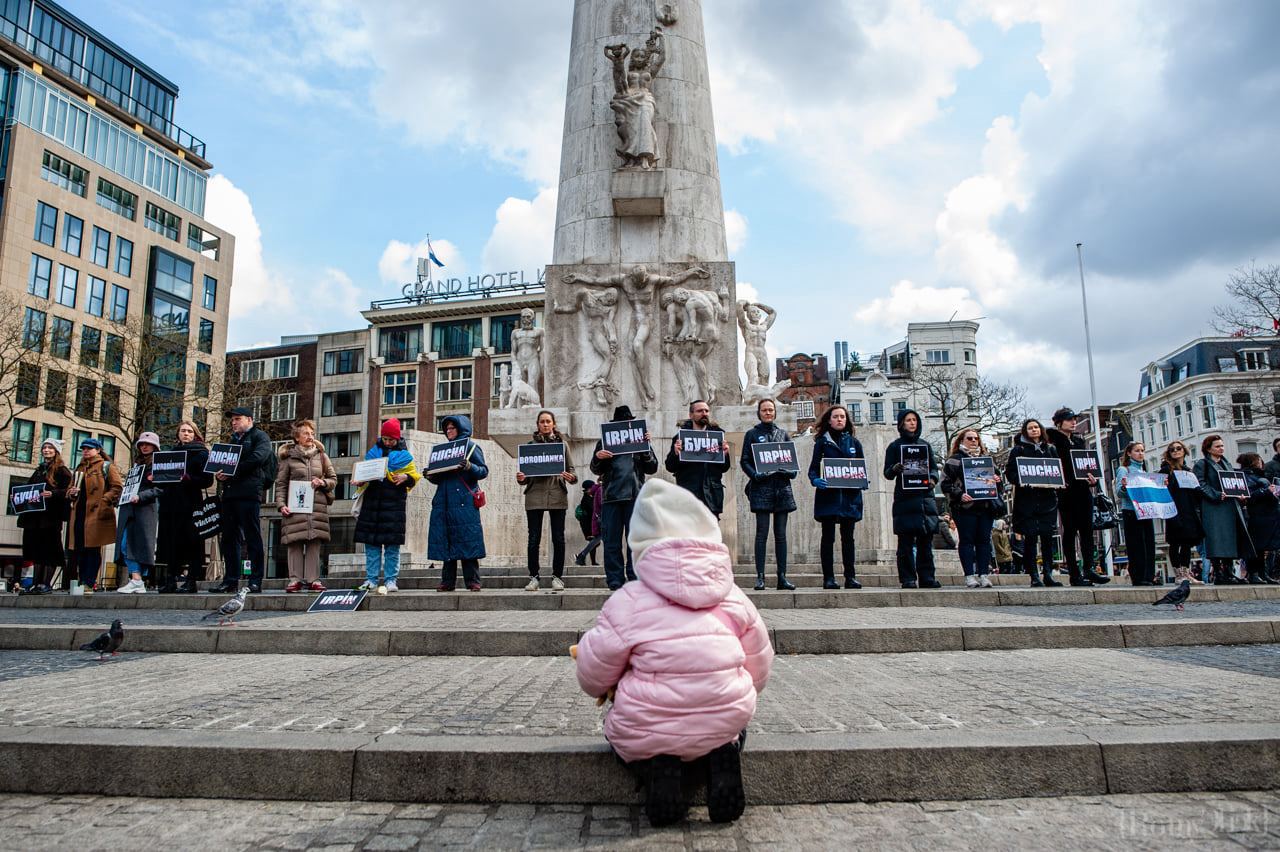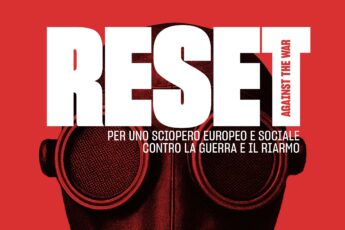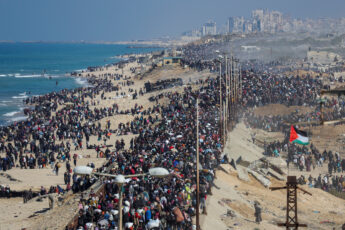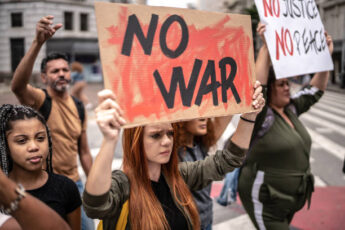
Right after the invasion of Ukraine, the TSS Platform published a statement titled No to War. For a Transnational Politics of Peace, which had a wide circulation. Its diffusion in Europe, from East to West, in the United States and Latin America has led to the creation of the Permanent Assembly Against War, a transnational space for discussion and organization not only to oppose the war, but to practice a politics that takes the side of those affected by the war in Ukraine, those who oppose the war in Russia, and all those who struggle not to be killed, exploited, and oppressed and who will suffer the consequences of the war on their living and working conditions. In order to support and give visibility to this process of organization and communication, we open a multi-voiced debate on what expectations the prospect of a transnational politics of peace raises, what its contents can or should be, what the obstacles to its realization are, and the plans for connections and actions that make it possible. The result is a first series of interviews with scholars and comrades who in recent years have contributed to the movement’s debate on issues, discourses and practices that a transnational politics of peace cannot ignore. We publish on this page the interviews to Jeremy Brecher (United States), Ida Dominijanni (Italy), Cinzia Arruzza and Tithi Bhattacharya (United States), Ranabir Samaddar (India).
Ida Dominijanni, essayist and philosopher, has practiced her reflections within feminism not only in Italy, and in particular with the philosophical community Diotima. Historical contributor of the “Manifesto” and many other newspapers, Dominijanni has long pursued a radical critique of the male way of interpreting, telling, making history. She contrasts to this the event of female freedom, its foundation within and against the history of sexual difference. Her views on the events of September 11, 2001 and the subsequent war on terror have recently been collected in the volume 2001. An Archive. September 11, the war on terror and the virus hunt (Manifesto Libri 2021). Her feminist reflection on war and on the crisis of contemporary state models offers a critically necessary contribution to account for the transformations produced by the Russian attack against Ukraine, the position of the European Union, the role of the United States and NATO in the global scenario, combining this understanding with the urgency of building a transnational politics of peace starting from “the common, singular and collective experience”.
***
The transnational politics of peace wants to be something more than international solidarity. It has the claim to build transnational connections that, while saying no to war, at the same time contest its effects on the living and working conditions of millions of women and men, LGBTQIA+ people, workers, poor, migrants and non-migrants, not only in Ukraine and Russia. Do you think this claim is realistic, or do you think we should prioritize positioning over the reconfiguration of the geopolitical framework?
Not only I do think this is a realistic claim, but I would also say that without this perspective it is the geopolitical discourse that becomes unrealistic. Unless one thinks that politics can only be power politics, and that it is only in the hands of the great powers, it is not possible to position oneself on the international chessboard without taking into account the social consequences of geostrategic choices. This has always been true, but it is all the more true now that the national-state dimension, which grounds geopolitical rationality, is in contradiction with the economic and cultural interconnections and interdependencies that redefine our globalized society.
Politicizing these interconnections, making them the starting point for transnational and intersectional political practices, is the only realistic way to revive a politics that is not trapped in the pure logic of power. It is also the only way to reveal its limits and to avoid making it more powerful than it actually is.
Beware, however, of deluding oneself that power politics can be ignored. On the contrary, the war in Ukraine reminds us that the geopolitical dimension is once again decisive for the fate of humanity. The problem, therefore, is how to intertwine the two perspectives, and it is not easily solved, given that they appear separated, as if one were impermeable to the other. One just has to think of how the narrative of war erases the dimension of the battle on the ground and negotiations on the one hand, and that of victims and refugees on the other. But we have to try. One might say that we must try to interweave biopolitics and geopolitics, two paradigms which are not much compatible, also conceptually. But I prefer to say that we must question and rethink politics starting from the common, individual and collective experience.
European states and the US are trying to present themselves as the champions of a democratic internationalism against the advance of Putin’s authoritarianism. The violence of the European border regime and neo-liberal capitalism with its devastating effects especially in Central and Eastern Europe seems to be erased. The appeal of Western governments to democratic values, far from indicating a commitment to the enlargement of social or civil rights, is merely functional to the hardening of opposing war fronts. A transnational politics of peace cannot be exhausted only in the necessary request for the end of hostilities nor in the call for democracy. How can we articulate a discourse that takes into account these contradictions within and beyond the war?
From the end of the Cold War onwards, the Western mainstream narrative of war has always been the same: war is waged in the name of democracy, under the banner of democracy, in defence of democracy, democracy allegedly being under attack by dictators, fundamentalists and autocrats. This narrative of democracy, which is both self-celebratory and victimist, emerged and grew when democracy won, from 1989 onwards, and while it won and wanted to win big it deteriorated, partly because it lacked that Other, real socialism, which, with all its misdeeds, nevertheless forced it to correct itself with the welfare state. In support of this narrative, the wall of the clash of civilizations is periodically erected – yesterday between the West and Islam, today between the West and eastern autocracies – which symbolically restores the bipolarity lost with the collapse of the Berlin Wall, as if the West and Western democracy could not think of themselves except in relation to an Other-Enemy, which, when it does not exist, has to be constructed. Finally, this narrative functions as a gigantic device for the ideal and cultural enlistment of Western public opinions, concealing the real strategic interests at stake, the real motivations of wars, the elements of similarity and twinning between the enemies fighting in the field, and above all the drifts of de-democratisation within Western societies and political systems. We know what happened during the long ‘war on terror’, when the armed exportation of an ideal democracy was matched by the adoption of securitarian policies within real democracies. With the war in Ukraine the paradox has become, if possible, even more strident. We wage war against the Russian autocrat while glossing over the radical failures that neoliberalism, as a form of political and not just economic rationality, has brought not only to the grammar of rights, but also to the institutional structure and anthropological basis of Western democracies. We rightly attack Putin and forget that only two years ago we feared the collapse of American democracy at the hands of Trump. And we make countries such as Ukraine and Poland, which are no less disturbing in terms of their level of nationalism and violation of fundamental rights, the new frontier of European democracy. Therefore, the banner of democracy is not credible if it is not accompanied by a self-criticism of democracies, and by the revival of social and political conflict, without which democracies perish. This self-criticism of democracy is, in my opinion, an essential, not an accessory, element in the construction of a transnational politics of peace that knows how to move within a political, not only a social, horizon.
From Ukraine, critical voices have been raised against a part of the Western left, which has ignored over the years what was happening in the East and now reads the situation in the framework of anti-American anti-imperialism or democratic Europeanism, with lenses and positions that are no longer suitable to the present. What does this war force us to see and what patterns and models does it force us to abandon?
I read some of these voices. They tell us, among other things, that in Ukraine and other countries of the former Soviet East, the need for democratization is a priority: a threshold from which there is no turning back. This desire for democracy must be welcomed and strengthened, but it must also be de-idealized, unlike what was done after 1989. To return to the previous answer, perhaps we should walk the narrow path between what is indispensable today and what is unacceptable in the democracies in which we live or in which others aspire to live.
On the other hand, these Ukrainian voices are asking us not to analyze what is happening in Western-centric terms, and they are right. It is true that American anti-imperialism is no longer a sufficient and congruent lens for the current situation – after all, I personally have never been an enthusiastic supporter of it, and it seems to me that already at the beginning of the century the imperial perspective had replaced the imperialist one in the analyses of a good part of the radical left. In the meantime, the United States has become a country deeply divided internally, struggling to come to terms with its (relative) decline, as well as with a war-weary society – so much so that now, after Afghanistan, it can only wage proxy wars, which are no less dangerous for that, of course. And other imperial, or in any case expansionist, vocations have been consolidated, such as China’s, or have resurfaced, such as Russia’s. I do not think we should underestimate Russia’s ideological pretension, which is evident in the speeches with which Putin ‘justified’ the aggression against Ukraine. I think we have too casually dismissed the criticism of the West set up by the various Dugin, Surkov, etc., which was anything but improvised.
But I would like to add another element. The great crises that we experienced since the beginning of the century – 9/11 and the subsequent war on terror; the economic and financial crisis of 2008-2011; the pandemic – to me, they all seemed to be characterized by the same dynamic: in all three cases they were global challenges answered by inadequate national responses. In Ukraine, it seems as if time is moving backwards, and that we are facing a nineteenth- or early twentieth-century war between two nationalisms. But is this the case, or is there once again a global stake behind the curtain of nationalism? I think so, because I think Ukraine is just the casus belli that Putin has chosen to aim at redesigning the global order. So the bloody contradiction between global and national has to be rethought. And it is urgent to rethink it here in Europe, because it is the European Union that risks an unmanageable resurgence of nationalism, above all but not only in the former Eastern countries, whatever may be the outcome of this war.
The war in Ukraine is a patriarchal war because it is reaffirming with bombs all the hierarchies that we contest. Men must be soldiers and show by fighting that they are true patriotic males. Transgender women cannot leave Ukraine because the border guards identify them as men. Women are treated as weak and powerless objects of protection, and the hundreds of thousands of migrants fleeing Ukraine will most likely be employed as a devalued labor force in essential sectors or in domestic work. How do you think a transnational politics of peace can challenge patriarchal and sexual hierarchies that the war is strengthening?
War always stiffens sexual hierarchies, and it does worse, authorizing macabre and gratuitous violence such as ethnic rape. But beware, something has changed in recent wars and in this one too. It is true that the myth of the ‘real man’, fighter and patriot, is consolidated. And it is true that the prevailing representation of women is crushed on the figure of the refugee-mother, victimized until she runs away from the bombs and used as a cheap labour force as soon as she crosses our borders. However, this binary representation has not been exhaustive for some time now. During the war in Iraq, for example, American female soldiers torturing Iraqi prisoners staged a macabre inversion of gender roles and forced us to dispose of any illusion that women were extraneous to the use of violence. From Ukraine, we get images of refugees, but also of virilised women who are masters of war rhetoric.
So, it seems to me that the gap to be investigated and leveraged is rather that between women who take distance from the values of traditional virility – think of the pacifist appeal of Russian feminists – and women who make them their own. I would add that in the case of the Ukrainians there is a further element to play on: these women have for many years been the true ambassadors of their country, those who have brought it, literally, into our homes. Of course our relationship with them has not been good enough, but I do not agree with reading it only as a relationship of exploitation: it is a relationship in which we often share the care of those closest to us. The first practice to be encouraged in a transnational politics of peace is the practice of relationship and exchange with these Ukrainian women, with Russian women, with women who refuse to define themselves as only Russian or only Ukrainian – and I know quite a few of them. And of course, with the men who desert the logic and practice of war. I would be very careful, however, not to deduce from this war a diagnosis of the good health of patriarchy. On the contrary, I am convinced that such a resurgence of male violence has something to do with its crisis, if not its end, and with a social pact that is struggling to recompose itself at all latitudes after the deconstruction and explosion of sexual and gender roles. Patriarchy no longer creates order, whether political, social or symbolic, and therefore resorts more than ever to violence, in the private and public spheres, in the personal and political dimension.
Someone argued that this war marks the end of globalization. What do you think will be the long-term transformations of this war that transnational peace politics must prepare for?
I think this question refers more to the economic side of globalization, and economics is not my expertise. I do not believe, however, in the theories about an imminent de-globalization: the interdependence of production processes and communication and logistics networks has gone too far to trigger a u-turn. Moreover, the very effects of the war and sanctions against Russia will unfortunately be global, albeit asymmetrically distributed, to the detriment of Europe and especially African and some Asian countries, which could be hit by famine and impoverishment. There will perhaps be an acceleration of a macro-regional reorganization of markets, which was however already underway under the direction of China. And several economists are predicting the end of the centrality of the dollar, which could trigger a global monetary disorder, which certainly concerns the United States more than Putin’s expansionism. This heralds years of great turbulence, which will be devastating unless a new cycle of transnational and global struggles gets underway.
The transnational politics of peace must act in the short term, in the face of the urgency of the war, but it must also be able to give itself an autonomous, longer-term perspective. How do you think these two dimensions can be combined?
I would like to turn the tables: I think we can achieve very little in the short term. There is an urgent need for a strong, well-grounded peace movement to counter the mindless arms race that Europe is embarking on, and more generally the great appetite for war that exudes from the mainstream public debate. But I fear that we will not be able to influence the course of the war. Whatever one thinks, in my opinion – and this is one of the lessons of feminism – it is the long term that is best suited to the weaving of grassroots practices of transformation of the given order. We have been fortunate enough to live in an era in which peace was, even in law, a precondition for democracy; now that the European democracies are arming themselves, we must come to terms with the fact that it is instead a construction, as difficult as it is necessary.





